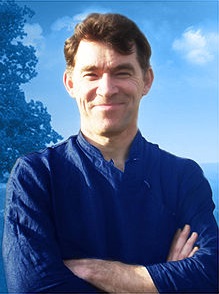Guest writer for Wake Up World
In recent posts, and in my new book Back to Sanity, I have suggested that the normal human state is to suffer from a psychological disorder, which I call ‘humania’. The two main elements of this condition are ‘cognitive discord’ — the restlessness of our minds, with their constant (and often negatively-tinged) thought-chatter — and ‘ego-separateness’, our sense of being an ‘I’ inside our own mental space, in separateness to other people and the world ‘out there.’
But we aren’t born with this psychological disorder. As children – especially young children – we are free of it. Like some of the world’s indigenous peoples, young children don’t experience themselves as an ‘I’ inside their heads, as a fragile egos separated from a world ‘out there’. They don’t feel as if they’re apart from the world, but are immersed in it, like people swimming in the river, rather than people on the bank watching it flow. As a result, children aren’t plagued by feelings of aloneness and incompleteness. They don’t feel a sense of lack, and a need to bolster their identity.
In addition, younger children’s minds don’t seem to continually buzz away with thoughts about the future and the past, replaying and anticipating scenes from their lives. They seem to be free of the kind of negative thoughts which afflict us as adults, and the feelings of worry, anxiety, bitterness or regret which those thoughts trigger. When was the last time you heard a six year old girl say, ‘I’m a bit worried about this birthday party I’ve got to go to next week. I don’t know the other children very well so I’m worried I might be left out’? When was the last time you heard a five year old boy say, ‘That boy over there ignored me when I walked past him last week, so I’m not talking to him today.’ Children are completely focused on the present.
This is one reason why, when people look back at their own childhood, they often remark on how real and intense everything seemed then; how colours seemed brighter, and flavours and tastes seemed richer. This is partly because the world is so new and fresh to children, but it is also a simple matter of attention. Whatever they do – whether it’s eating some chocolate, having a bath, listening to a song or a nursery rhyme or playing on the swings – children pay full attention to their experience. There is no thought-chatter to take their attention away from the is-ness of their perceptions and sensations. On a playground, they don’t waste time thinking about what they’re going to do at nursery tomorrow, or compare this playground to others they’ve been to recently – they give themselves completely to the joy and excitement of playing. Even when we aren’t aware of thinking distinctly about anything, there is still usually a vague mental fog inside our heads, made up of undefined images and scraps of concepts and ideas, and this dilutes the intensity of perceptions and sensations. And without this fog of abstraction, the children’s experience is richer and fresher.
In other words, young children experience much less psychological discord than adults. (They certainly experience emotional discord frequently – intense waves of anger or frustration when their desires aren’t met or when they feel tired and insecure. But these pass through them very quickly and don’t leave any traces of discontent behind them.) As a result, they aren’t as vulnerable to anxiety when they have unstructured free time or when there’s quietness and stillness around them. Of course, children like to be active and creative and will eagerly watch TV if their parents let them, but — apart from a brief storm of frustration perhaps — they don’t feel a sense of unease when activities come to an end. One of the differences between them and adults is that they latch their attention to external ‘hooks’ only because the activity or the entertainment is interesting to them, whereas we often do this as a way of escaping from the discord inside us.
This is also why children don’t need to take drugs or drink alcohol, why they don’t need material goods, or why they don’t need to define themselves in terms of their ethnic group or religion (although that doesn’t stop adults foisting religion on them, of course.) There’s no discontent for them to try to override, no incompleteness for them to fill, no sense of insignificance for them to compensate for.
This freedom from humania is simply a question of psychological development. Psychologists believe that young babies don’t have any sense of self whatsoever, and have no sense of separation between themselves and the world. The sense of separation appears to develop from the age of 6 months, but only becomes fully developed in the late teens, at roughly the same state that we become fully developed physically. Young children – say, before the age of 8 or 9 – have a very flimsy sense of self. The boundary between their self structure and the world is very weak, like a fragile wire mesh fence between two fields. The ‘ego-boundary’ only becomes solid around the mid teens, when we first begin to have a clear sense of inhabiting our bodies, of being a ‘ghost in the machine.’
That’s when we become afflicted with humania. I’m not saying that we should return to the childhood state — we obviously need the logical and practical abilities of the adult mind to function in the world. But we can become free of humania, on a different level, through a process of psychological or spiritual development — a subject I will turn to in an upcoming blog.
Recommended articles by Steve Taylor, Ph.D:
- Can Suffering Make Us Stronger?
- Transformation Through Dying: The Aftermath of Near Death Experiences
- Elation: The Amazing Effect of Witnessing Acts of Kindness
- The Power of Forgiveness: The Transformational Effect of Letting Go of Resentment
- Transcendent Sexuality — How Sex Can Generate Higher States of Consciousness
- The Power Of Silence
- Happiness Comes from Giving and Helping, Not Buying and Having
- Empathy – The Power of Connection
- If Women Ruled the World – Is a Matriarchal Society the Solution?
- Beyond Anxiety: The Roots of Anxiety and How to Transcend It
About the author:
Steve Taylor is a senior lecturer in Psychology at Leeds Beckett University, UK. His latest books in the US are The Calm Center and Back to Sanity: Healing the Madness of the Human Mind. He is also the author of The Fall, Waking From Sleep, and Out Of The Darkness. His books have been published in 19 languages. His research has appeared in The Journal of Transpersonal Psychology, The Journal of Consciousness Studies, The Transpersonal Psychology Review, The International Journal of Transpersonal Studies, as well as the popular media in the UK, including on BBC World TV, The Guardian, and The Independent.
Connect with Steve at StevenMTaylor.com.

If you've ever found value in our articles, we'd greatly appreciate your support by purchasing Mindful Meditation Techniques for Kids - A Practical Guide for Adults to Empower Kids with the Gift of Inner Peace and Resilience for Life.
In the spirit of mindfulness, we encourage you to choose the paperback version. Delve into its pages away from screen glare and notifications, allowing yourself to fully immerse in the transformative practices within. The physical book enriches the learning process and serves as a tangible commitment to mindfulness, easily shared among family and friends.
Over the past few years, Wake Up World has faced significant online censorship, impacting our financial ability to stay online. Instead of soliciting donations, we're exploring win-win solutions with our readers to remain financially viable. Moving into book publishing, we hope to secure ongoing funds to continue our mission. With over 8,500 articles published in the past 13 years, we are committed to keeping our content free and accessible to everyone, without resorting to a paywall.








